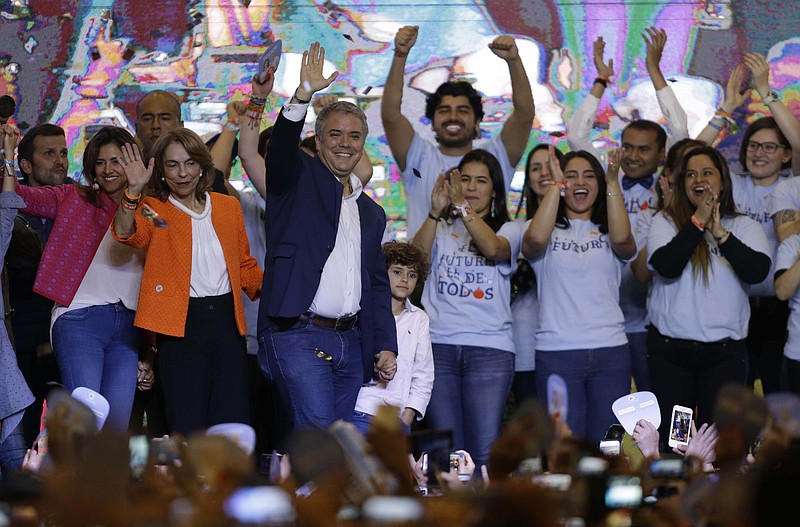BOGOTA, Colombia (AP) — Uncertainty loomed over Colombia’s fragile peace deal Monday with the victory of one of its most hawkish critics in a bruising presidential runoff that laid bare deep divisions in the South American nation as it emerges from decades of bloody conflict.
Ivan Duque, a law-and-order disciple of a powerful former president, won Sunday’s vote with a commanding 12-point lead over rival Gustavo Petro, a former rebel and ex-Bogota mayor.
On the campaign trail, Duque repeatedly vowed to roll back benefits inscribed in the deal, such as demanding rebel commanders behind scores of atrocities first confess to their war crimes and compensate victims before they are allowed to take up the congressional seats they have been promised in the accord.
However, once he takes office in August from the peace deal’s architect, President Juan Manuel Santos, Duque is likely to tread softer if he wants to broaden his base of support and unite the country, analysts said.
“Ironically, he has a chance to make the accords stronger by providing something the peace process has lacked from the outset: a national consensus,” said Michael Shifter, a longtime observer of Colombia and president of the Inter-American Dialogue in Washington.
This year’s elections were the safest in generations, a testament to how far the country has already come in putting Latin America’s longest-running conflict behind it. Not a single act of violence affected the campaign.
In the final stretch before the vote, as victory seemed within reach, the pro-business Duque was already moderating some of his proposals, including a call to overturn a negotiated amnesty for rebels involved in drug trafficking. He also stressed that rank-and-file guerrillas of the Revolutionary Armed Forces of Colombia would have his full support in making their transition to civilian life.
While Santos didn’t endorse any candidate and has feuded with Duque’s mentor, former President Alvaro Uribe, throughout his eight years in office, two of Santos’ advisers on the peace process have quietly migrated to the Duque camp in recent months, which is likely to make for a smoother transition.
“This is the opportunity that we have been waiting for,” the 41-year-old Duque said in his victory speech, playing up his youth — he is the youngest Colombian president ever elected in a popular vote — and pledging “to turn the page on the politics of polarization, insults and venom.”
His biggest challenge will be reining in the pressure from conservative allies. As a senator Duque earned a reputation for being a thoughtful, cordial adversary who frequently stretched his hand across the aisle, but some of his prominent backers are outright hostile to the FARC. Hours after his victory, congresswoman Maria Fernanda Cabal blasted on social media: “The FARC lost. Colombia won!”
One unknown is how much influence Uribe will wield. Duque was elected to Colombia’s Senate in 2014 barely two months after returning to Colombia from Washington, where he had worked for more than a decade at a development bank, thanks to Uribe’s endorsement. Throughout his presidential campaign, he was dogged by accusations he would be little more than a puppet for Uribe, who is constitutionally barred from seeking a third term. Though praised for weakening the FARC and drawing record foreign investment, Uribe has also been blamed for the military’s killing of thousands of civilians who were falsely accused of being rebels.
“He will have to make some adjustments to the accord, if only to placate Uribe and other hard-liners and avoid being labeled a traitor,” Shifter said. “But these could be relatively modest and not put the entire peace effort at risk.”
It’s also not clear how much leeway there is to make changes to the 310-page accord that put a formal end to a conflict that caused more than 250,000 deaths. Colombia’s constitutional court has declared some aspects of the agreement irreversible. For Duque to prevail in his call for substantive “corrections” that deliver “peace with justice,” he’ll likely need to build political support in Congress that he currently lacks to pass a constitutional reform.

